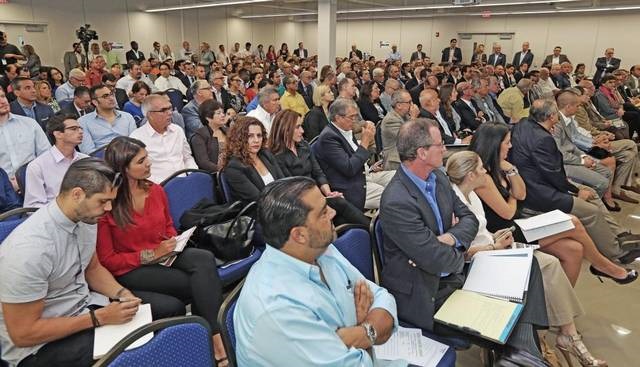Investing In Cuba Remains ‘Very Risky,’ Panelists Say
By Ana Veciana-Suarez

Exploring business potential on the Communist island has surged since December
The infrastructure is dated but so is the mindset
For now investors must get used to the state as the majority partner
Panelists at a CEO roundtable about the future of Cuba painted a mixed and ever-evolving picture of the opportunities — and risks — for businesses that want to invest in the Communist island.
“Cuba is like the Galapagos Islands,” Augusto Maxwell, chair of Akerman LLP’s Cuba practice told a standing-room only audience in the community room of the Miami Herald/El Nuevo Herald on Tuesday. He went on to describe a country in evolution, where what holds true today may not work tomorrow and where establishing a business remains a “very risky” endeavor.
But like other panelists in the morning program titled “The Future of Cuba — Investing and Tourism,” he said changes are occurring, though not as always as quickly or as efficiently as foreign investors would like. He pointed to the entry of Airbnb, the San Francisco-based company that launched its home-booking service in Cuba in April. Since it went live, Airbnb, has accumulated more than 2,000 listings, making it the fastest-growing launch in the company’s history.
But Airbnb’s entry into the island, Maxwell said, “was inconceivable a few years ago.”
Maxwell was among a group of Cuban experts — a lawyer, a bank president, an airline vice president, three travel and tourism executives and even a former U.S. senator — who debated the business potential on the island in a pair of panels that focused on investing and tourism in Cuba. Restrictions on both travel and business have eased since the Dec. 17 announcement by President Barack Obama and Cuban leader Raul Castro that the two countries would renew diplomatic ties and open embassies after half a century of frosty relations.
While the panelists steered clear of the political fireball that the recent rapprochement sparked in Miami, they all agreed on one theme: Cuba is still the great unknown. Those who venture there should be prepared to commit time, effort and capital without a clear or quick return on their investment.
Steven N. Zack, a partner with Boles, Schiller & Flexner and the first Cuban-American president of the American Bar Association, said he is often asked about the legal system in Cuba. His response? There is no legal system in Cuba because there is no due process and a businessman has to be willing to take a back seat to a government that acts as a majority owner in all enterprises.
He told the cautionary tale of a Canadian businessman who had invested on the island for almost two decades, until he was thrown in jail on corruption charges. The Canadian, Sarkis Yacoubian, spent more than two years in jail before being found guilty and expelled. His case is not unique.
“We know one thing for sure,” Zack said. “He didn’t get his business back. Raul Castro’s son-in-law did.”
He added that any time he asked a question of a Cuban lawyer during a recent law conference on the island, he never got a concrete reply. “The answer is always the same: Es muy complicado.” (It’s very complicated.)
Other panelists talked about the difficulties of dealing with an inefficient system that, even when trying its best, simply didn’t have the technology or infrastructure to meet business or tourism demand. Tessie Aral, president of ABC Charters, which has provided limited air and travel services to the island since 2000, said there aren’t enough hotel rooms to meet the surging demand. Casa particulares (or bed & breakfasts) have picked up on the demand.
But lack of rooms is only one of many obstacles, she added. Government bureaucracy is a problem, too, and any investor considering Cuba needs to “learn to work with their infrastructure but also their mindset.”
Cuba’s interest in opening itself up to the United States is all about economics. The island desperately needs about $2.6 billion a year in foreign investments. But, said former U.S. Senator Mel Martinez, opening the door “is not an invitation to business.” Martinez, who came to the U.S. as an unaccompanied minor in the Pedro Pan airlift, warned that the government rhetoric may havechanged but the rules of the game haven’t. He expressed dismay that the U.S. had made too many concessions.
“What did we give? What did we get? What should we have gotten?” he asked.
Zack compared the complicated relationship between the U.S. and Cuba — and their respective business interests — as a complicated dance in which the first step has been taken but the question remains: Do potential American investors truly have a partner in Cuba?
“My position is we should engage in the dance,” he said, “but we shouldn’t dance by ourselves.”
First published in The Miami Herald.

